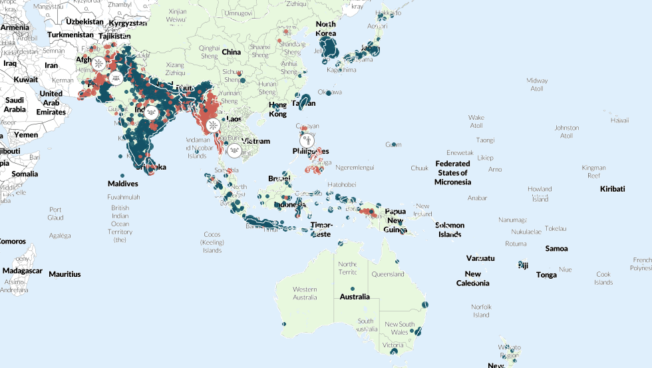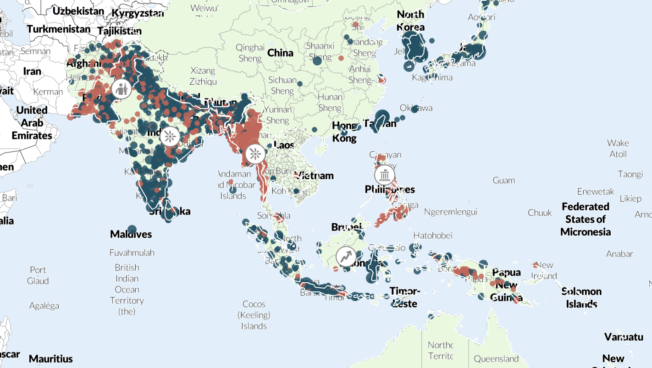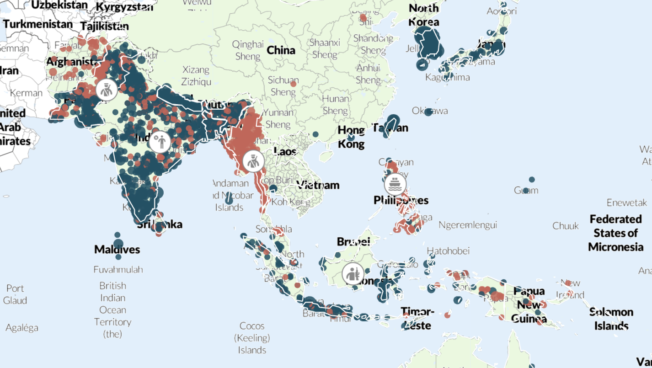Regional Overview
Asia-Pacific
April 2025
Posted: 4 April 2025
In this Regional Overview covering March 2025
- Bangladesh: Militant activity heightens in Rohingya refugee camps
- Myanmar: Civilians subject to increased deadly airstrikes in Magway and Mandalay regions
- Pakistan: Separatist violence escalates further in Balochistan
- Papua New Guinea: Deadly violence breaks out at Porgera gold mine
- South Korea: Pro- and anti-President Yoon demonstrations intensify ahead of President Yoon’s removal
- Thailand: Separatists carry out large-scale assaults in the Deep South during Ramadan
Bangladesh: Militant activity heightens in Rohingya refugee camps
Militant activity in Rohingya refugee camps in Bangladesh’s Cox’s Bazar increased in March. The Arakan Rohingya Salvation Army (ARSA) was involved in four violent actions, including clashes with the rival Rohingya Solidarity Organization (RSO) and attacks on civilians. This marked the most activity involving ARSA in a single month since December 2023. ARSA, formed to end the persecution of Rohingyas at the hands of the Myanmar state forces,1International Crisis Group, “Myanmar: A New Muslim Insurgency in Rakhine State,” 15 December 2016, pp. 12-18; BBC News, “Myanmar Rohingya: What you need to know about the crisis,” 23 January 2020 operates within Bangladesh’s refugee camps2Human Rights Watch, “Bangladesh: Spiraling Violence Against Rohingya Refugees,” 13 July 2023 and has frequently clashed with the RSO over dominance. On 4 and 16 March, ARSA killed two RSO members in separate incidents, while a gunfight between the two groups in Cox’s Bazar resulted in one person killed on 8 March.
Rights groups have consistently urged Bangladesh authorities to protect Rohingya refugees caught in the middle of clashes between armed groups and have accused them of failing to do so.3Human Rights Watch, “Bangladesh: Spiraling Violence Against Rohingya Refugees,” 13 July 2023 In a significant development, Bangladesh’s Rapid Action Battalion arrested ARSA leader Ataullah Abu Ammar Jununi on the outskirts of Dhaka on 18 March.4Midhat Fatimah, “Bangladesh arrests leader of Rohingya insurgent group,” Deutsche Welle, 19 March 2025 Jununi was reportedly partly responsible for instigating a series of attacks on Myanmar border outposts in 2016 and 2017 that led to a military crackdown on the Rohingya community in Myanmar and the exodus of more than 750,000 Rohingya refugees to Bangladesh.5Hannah Beech, “Armed Rohingya Group’s Leader Is Arrested in Bangladesh,” The New York Times, 19 March 2025; Ruma Paul and Sudipto Ganguly, “Rohingya in Bangladesh pray for release of arrested insurgent leader,” Reuters, 20 March 2025 Despite his arrest, the group’s continued violence — including killings, abductions, torture, sexual assault, and forced marriages that target critics, opponents, and members of the wider community6Fortify Rights, “I May Be Any Moment: Killings, Abductions, Torture, and Other Serious Violations by Rohingya Militant Groups in Bangladesh,” 18 March 2025, pp. 27-45 — is likely to persist as key ARSA figures urge continued action.7Sanchita Bhattacharya, “Bangladesh: Change of Regin in Arakan Army,” Sri Lanka Guardian, 1 April 2025 Following Jununi’s arrest, dozens of Rohingya refugees held prayer meetings demanding his release.8Ruma Paul and Sudipto Ganguly, “Rohingya in Bangladesh pray for release of arrested insurgent leader,” Reuters, 20 March 2025
Myanmar: Civilians subject to increased deadly airstrikes in Magway and Mandalay regions
Fatalities from military airstrikes significantly increased in March. The military’s escalation was most felt in the Magway region, which recorded more than triple the number of airstrikes compared to February; and in the Mandalay region, which recorded the highest number of reported fatalities among all states and regions. ACLED records around 250 airstrike events carried out by the military in March, with one-third of these occurring in the Magway and Mandalay regions.
The recent increase in airstrikes in Magway is likely aimed at countering the Arakan Army’s offensives, which have targeted military weapons facilities in Magway and Bago regions. Last month, the Arakan Army inflicted heavy casualties on the military, including over 100 reported fatalities, during the capture of a telecommunications tower outpost in Ngape township, Magway region. During one junta airstrike on 22 March, 11 civilians — including a doctor, his pregnant wife, and a nurse — were killed in Gangaw township.
In the Mandalay region, the military carried out targeted strikes on resistance-controlled areas. In the deadliest strike of the month, the military dropped bombs on a crowded market on the Mogoke-Mandalay road in Singu township on 14 March, which is under the control of the Mandalay People’s Defense Force and allied resistance groups, killing at least 27 civilians including six children.9Facebook @Myanmar Pressphoto Agency, 15 March 2025 Despite the devastating 7.7 magnitude earthquake on 28 March that caused widespread destruction and killed over 3,000 people, the military has blocked aid and rescuers from entering areas they do not fully control in Sagaing and Mandalay regions, requiring permits to prevent medicine from reaching resistance-controlled areas.10Kate Lamb and Rebecca Ratcliffe, “Myanmar junta accused of blocking aid for earthquake victims as airstrikes continue,” The Guardian, 1 April 2025
Between 28 and 31 March, the military conducted 17 more airstrikes, relentlessly continuing their attacks despite the widespread earthquake devastation and the desperate need for emergency relief. On 2 April, the military announced a unilateral temporary ceasefire for three weeks, with several other armed groups also announcing similar ceasefires before and after the military’s announcement.11Koh Ewe, “Myanmar military announces temporary ceasefire,” BBC Burmese, 2 April 2025 However, the military quickly broke the ceasefire, conducting airstrikes in at least five locations, including Indaw township in quake-hit Sagaing region, the following day.12Min Maung and Maung Shwe Wah, “Junta’s ceasefire broken by offensive airstrikes on Kachin and Rakhine,” Myanmar Now, 3 April 2025
Pakistan: Separatist violence escalates further in Balochistan
Baloch separatist violence in Pakistan escalated in March, both in frequency and lethality. On 11 March, Baloch Liberation Army (BLA) militants hijacked the Jaffar Express train, holding passengers hostage in the remote Bolan Pass area for two days. Nearly 100 off-duty military personnel were reportedly among the passengers.13Abid Hussain, “Deadly Pakistan train hijack: What happened, who was rescued, what’s next?” Al Jazeera, 11 March 2025 According to officials, militants reportedly killed 26 passengers — including 18 who were military personnel — in the initial attack, with the subsequent military operation resulting in at least 38 reported fatalities. The BLA, on the other hand, claimed its militants executed 214 hostages.14Hannah Ellis-Petersen and Shah Meer Baloch, “‘He only wanted revenge’: the bloody insurgency in Balochistan gaining lethal momentum,” The Guardian, 24 March 2025 Neither the official nor the BLA account has been independently verified.15Hannah Ellis-Petersen and Shah Meer Baloch, “‘He only wanted revenge’: the bloody insurgency in Balochistan gaining lethal momentum,” The Guardian, 24 March 2025 While trains are preferred over roads for troop movement from a security perspective, Baloch separatists have frequently targeted them. ACLED data show no less than 18 attacks against trains and railway infrastructure in the last three years, though the March attack remains the deadliest to date.16Dr Farzana Shaikh, “The hijacking of a train marks a watershed in the Balochistan insurgency,” Chatham House, 21 March 2025
Violence again escalated toward the end of the month, as separatists, led by the Baloch Raaji Aajoi Sangar (BRAS), carried out a series of attacks across the province on 27 March, coinciding with the anniversary of Balochistan’s accession to Pakistan in 1948.
In response to the increase in militant activity, the Pakistani security establishment intensified its crackdown on Baloch activists by dispersing protests and detaining leading activists. The Pakistani government accuses activists of fomenting militancy through their advocacy against state excesses in Balochistan.17Dawn, “UN experts demand release of detained Baloch activists, end to crackdown on protests,” 26 March 2025 On 21 March, gunshots fired by police killed at least three demonstrators in the provincial capital, Quetta. Baloch separatist activity is expected to continue escalating amid the announcement of a new strategy by the BRAS alliance on 2 March, wherein the various separatist groups plan to unify under a centralized command to intensify their insurgency.18The Balochistan Post, “BRAS Announces ‘Decisive New War Strategy,’ Plans to Form Baloch National Army,” 2 March 2025
Papua New Guinea: Deadly violence breaks out at Porgera gold mine
A deadly clash between informal miners and state security forces at the Porgera gold mine in Enga province in March highlighted the ongoing challenges of maintaining security and the fragility of peace agreements in resource-rich areas of Papua New Guinea. On 2 March, armed informal miners from the Sakar tribe attempted to enter a restricted area of the mining facility, which led to a shootout with state security forces.19Miriam Zarriga, “Two illegal miners shot dead,” Post-Courier, 3 March 2025 Two miners were killed during the incident, marking the first deaths recorded by ACLED at the Porgera mine since December 2024. In an act of immediate retaliation, miners torched mining equipment owned by the New Porgera Limited mining company. On 3 March, members of the Sakar tribe blocked a section of the main highway connecting Porgera and Laiagam – a critical route for economic activities and access to essential services – severely disrupting transportation and supply routes.20Miriam Zarriga, “Laiagam road closed,” Post-Courier, 3 March 2025 In response, authorities issued a 24-hour ultimatum for the tribe to remove the blockade and restore access, and the tribe eventually complied.21Simiky Yandapake, “24 hours given to repair the road,” Post-Courier, 4 March 2025
The Sakar tribe’s attempt to enter the restricted area violated a peace agreement signed on 31 January between the tribe and state security forces.22Simiky Yandapake, “Day two of Porgera peace accords: Emergency peace agreements signed,” Post-Courier, 1 February 2025 The agreement, which was aimed at preventing unrest, required Sakar members and other signatories to cease informal mining, refrain from supporting informal miners, waive compensation claims for mining-related deaths, and uphold law and order.23Post-Courier, “Two illegal miners shot dead,” 5 March 2025. Print newspaper The subsequent retaliation further breached their commitment to maintaining stability in the area, marking a significant setback for peace efforts. In 2024, there were over 30 reported fatalities related to the Porgera mine, the most in a single year since ACLED began covering Papua New Guinea.
For more, see this ACLED thread on X about the last major violent incident near the gold mine in September 2024.
South Korea: Pro- and anti-President Yoon demonstrations intensify ahead of President Yoon’s removal
The Seoul Central District Court’s cancellation of President Yoon Suk Yeol’s arrest warrant on 7 March intensified the mobilization of both Yoon supporters and detractors. ACLED records nearly 300 pro- and anti-Yoon demonstrations during the month — an around 80% increase compared to February. With the Constitutional Court’s unanimous ruling to remove Yoon on 4 April, tensions between opposing demonstrators are likely to remain high — especially with a presidential election expected in early June.
Amid mass demonstrations in major cities, several experienced notable outbreaks of violence in March. ACLED records four violent demonstrations in which verbal disputes escalated into clashes and physical altercations between rival demonstrators, resulting in injuries. This rise in violence coincided with a surge in pro-Yoon protests leading up to the court’s reinstatement of Prime Minister Han Duck-soo as acting president on 24 March. Yoon’s supporters claimed that this decision legitimized his declaration of martial law since its stated aim was to counter the opposition’s impeachment attempts. Moreover, they called for a “popular revolt” and even “civil war” in response to his impeachment.24France 24, “South Korean pastor vows revolt against Yoon’s impeachment,” 12 March 2025; Associated Press, “What to know about the reinstatement of South Korea’s No. 2 leader and the Yoon ruling to come,” 25 March 2025; MBC, “Jun Kwang-hoon: ‘If Yoon doesn’t return, a civil war will break out’ … Yoon Sang-hyun also mentions “declaration of war,’” 22 March 2025 The national police have responded to the rising tensions by barricading the court to prevent violent clashes between Yoon’s supporters and opponents, who continue daily sit-ins and picket demonstrations in close proximity nearby.25The Korea Herald, “Fortified court, tense Seoul,” 14 March 2025
For more information on the actors and demonstrations, see ACLED Q&A: Who are the pro- and anti-Yoon groups leading demonstrations in South Korea?
Thailand: Separatists carry out large-scale assaults in the Deep South during Ramadan
Separatist insurgents launched coordinated attacks on state forces while destroying properties in the Deep South during the Muslim holy month of Ramadan, which lasted from 28 February to 30 March. The attacks began with a bomb explosion in Yala province on 5 March, followed by an explosion at a Buddhist ordination ceremony the following day that resulted in injuries to civilians. In another notable incident, on 8 March, dozens of armed Malay Muslim separatists attacked the Su-ngai Kolok district office in Narathiwat province with firearms and grenades, killing two defense volunteers and injuring eight others. The separatists also set fire to electronic poles and cameras in at least four locations.
Ramadan has often ushered in temporary ceasefires in Thailand’s Deep South region. In 2013 and 2022, the state and the BRN agreed to enact a truce during Ramadan. However, March witnessed more fatalities than February, with seven people reportedly killed. ACLED also records an increase in overall separatist activities by around 30% in March compared to February. The increase coincided with the 65th anniversary of the founding of the Barisan Revolusi Nasional (BRN) on 13 March.26Isranews Agency, “Thaksin reveals he has talked to BRN – Who is he talking to and who is BRN?” 16 March 2025 (Thai) The BRN is a prominent separatist group known for orchestrating attacks in the Deep South. While the timing and scale of attacks appeared to be building momentum ahead of the BRN anniversary, the attacks may also be a response to former Prime Minister Thaksin Shinawatra’s visit to the region last month, which ostensibly aimed to resolve the conflict.27BBC, ‘Southern Border: Will choosing to ‘talk in secret’ without opening a formal negotiation table lead to violence during Ramadan?’ 10 March 2025 (Thai)
See More
See the Codebook and the User Guide for an overview of ACLED’s core methodology. For additional documentation, check the Knowledge Base. Region-specific methodology briefs can be accessed below.
Links:
- Methodology and Coding Decisions for Political Violence and Demonstrations in Afghanistan
- Methodology and Coding Decisions for Political Violence and Demonstrations in China and Taiwan
- Methodology and Coding Decisions for Political Violence and Demonstrations in Myanmar
- Methodology and Coding Decisions for Political Violence and Demonstrations in North Korea







